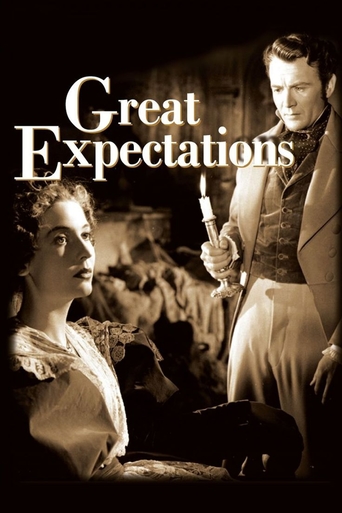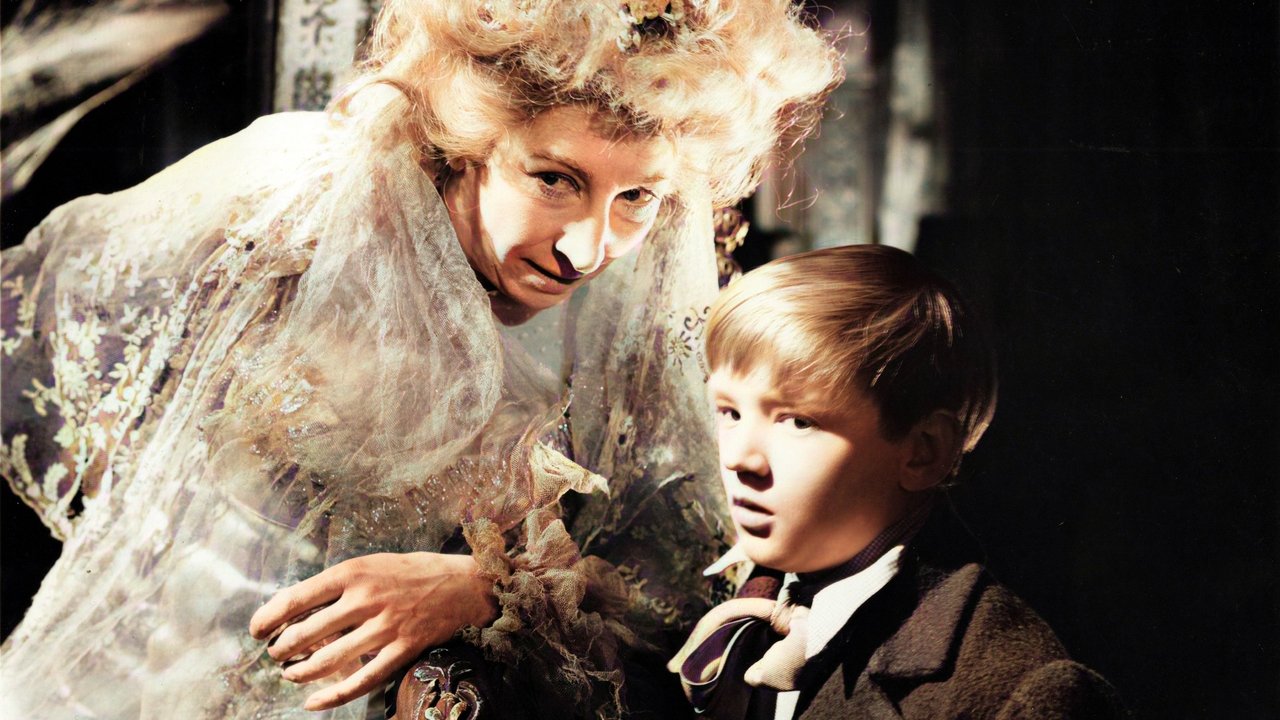HotToastyRag
While this version wasn't technically the first, it's universally referred to as "the original" adaptation of Charles Dickens's novel Great Expectations. If you don't know the story, it follows the journey of a poor young boy Pip who is sent to play with the beautiful Estella, by request of the wealthy and strange Miss Havisham. He sees his commonness in contrast to her delicate beauty, and resolves to become a gentleman when he grows up, so that he might be worthy of her. There's a lot more to the story than that, but if you want to learn more, either pick up the book or rent the 1946 film version. The original really is the best.John Mills plays grown-up Pip, and it's hard to watch any other version—out of the dozens of remakes out there—without comparing other actors to him. Plus, he looks very handsome in 1800s costumes! Young Pip is played by Tony Wager, and it's as if the camera crew really found him in the graveyard as they filmed the opening scene. His fear and shame in the beginning of the film is intense; I'm always amazed at the talent of young actors. Jean Simmons played young Estella, and audiences were so transfixed by her cold beauty, she became an instant star.Another familiar face to look out for is a young Alec Guinness, as the young "pale faced gentleman". The tragic acting of the cast, and David Lean's old-style direction that captures the spookiness of Miss Havisham's world, is superb. There have been so many failed attempts to recapture the magic of Great Expectations, and I've seen almost all of them. I didn't see the 1991 version, in which Jean Simmons plays Miss Havisham, though. I thought that would be rather sad to watch. Save yourself the trouble of hunting down every known version, and buy a copy of the 1946 version. It will become your go-to movie on dark winter nights, believe me.
Charles Herold (cherold)
The first 40 minutes of Great Expectations is as good as anything in filmmaking. Wonderfully atmospheric, with gorgeous black and white cinematography, the movie is pitch perfect in every way.The rest of the movie is quite good, with many fine performances and scenes and an engaging story, but there are a few things that weaken it.While some of this may be that the early, rural scenes offer more opportunity for lush visuals and a sense of wild adventure, I think the greater problem is the two adult leads.The children are great. Wagner's unfailingly polite Pip has just the right feel of confusion mixed with good manners as his fate is controlled by others. Jean Simmons is amazing with her haughty disdain and mercurial disposition.Then the kids grow up into John Mills and Valerie Hobson, and things decline. The problem with both roles is you get now sense of their past. Mills has a change of fortune as an adult, but up until then he's a simple village boy, yet he speaks well at every time, lacking any sense of country habits or manners. And in spite of her remarkable upbringing, Hobson comes across as just pleasant, with none of the anger or secretiveness or resentment you would expect to peek just out of the shadows.I'm not saying the characters had to be played in exactly the way I'm describing, with more roughness to Pip and more animalism to Estelle, but *something* needed to be done in both roles to bring the characters alive. Mills and Hobson are simply uninteresting in a movie full of interesting people.That is not to say that all of the movie is not excellent. I was electrified when I saw it and promptly read the book, which is my favorite by Dickens. But with better casting this film could easily have been perfect, and I always feel a little let down at the moment Pip grows up.
kennethfrankel
This is a question. Miss Havisham blocked out the outside world and did not want to know the time or day. How then did she know when her birthday was coming? Yes, her relatives show up then, but she said at one point (I believe) that it would be tomorrow.With all the dust and mold it seems very unhealthy for the young girl or anyone else.It seems that the convict took a big chance going to England - he has an appearance that is hard to mask. With the money he had, how hard could it have been to find a sneaky way out of the country. Did the 2 young men have to go through the routine of rowing each day when they felt they were being watched? England is an island, after all - money could buy a carriage and a boat. But unlikely coincidences are part of the author's style.
Bill Slocum
Charles Dickens made things hard on his cinematic adaptors. "Great Expectations" is a classic example, a flood of vital characters, imposing social themes, and startling coincidences. David Lean took it on by offering a film that works more as a revue of setpieces than unified story, but in those lights, works quite well - most of the time.When we meet Phillip Pirrip, a. k. a. "Pip," he is a boy of 13 wandering the moors near his adopted home in the English country. An escaped convict, Magwitch, makes him promise under duress to bring him file and vittles. Pip does so, his first stand against an unfair social order.In time, he finds himself a victim of that order when he falls for a proud beauty who sneers he is "a common laboring boy." Her adopted mother Miss Havisham, a wealthy hater of men since her own failed attempt at marriage, enjoys the show. Then, suddenly, things take a turn. Pip is given money, lots of it, and the news he is a man of "great expectations" courtesy of an unknown benefactor. Pip thinks he knows who she is.Two things weigh strongly in this film's favor. One is the look and feel. Cinematographer Guy Green and production designed John Bryan give every scene the look of a vintage woodcut by Dickens' illustrator-collaborator George Cruikshank. You feel watching Pip wander the moors or walk the streets of London that you aren't in the real places but inside the book itself.The other major positive is the supporting cast. Even the extras have the right look about them. Reviewers here single out, rightly, the work of Francis L. Sullivan as the officious yet decent and fair lawyer Jaggers, "deep as Australia" and nearly as wide; and Jean Simmons as young Estella, the girl Pip loves. Yet even the smaller parts dazzle, like Pip's mean sister-guardian Mrs. Joe (Freda Jackson) and John Forrest as a most amiable and ineffectual bully named Pocket who grows into the likable Alec Guinness in his first major film role.The big weaknesses, also pointed out by many reviewers here, are the two leads. Valerie Hobson is all wrong as the adult Estella, a part that cried out for the services of her "Kind Hearts And Coronets" costar Joan Greenwood, throaty voice notwithstanding. John Mills shows more skill as the adult Pip, especially in his big revelation scene with his benefactor, but he's miscast, too, a stiff toff even when playing for sympathy. His love scenes with Hobson and the somewhat overplayed Miss Havisham (Martita Hunt) are the film's Achilles heel, sucking up precious oxygen whenever they come up, all the way through to the unsatisfying obtuse finale.Lean and his four assistant screenwriters work hard to keep things tight, a blessing as it allows us to focus on the setpieces, the visuals, and the supporting players as they roll by quickly. There are mistakes, like playing Miss Havisham as a horror-movie character and a silly business in the beginning of Pip hearing accusing voices from cows and dead rabbits after robbing his family larder to feed the convict.Lean did better work on his next Dickens adaptation, "Oliver Twist," but that is because I think it is a stronger story, or at least more easily tightened and less dependent on clanging coincidences than "Great Expectations." Perhaps the many who would disagree with me on the relative merits of the two novels will find this more a classic, and favor it more.What you get here is not a finely-woven yarn but a shimmering mosaic of brilliant jewel-like clusters, not fitting well together but dazzling in their collective display. Lean, despite his detractors, did craft solid stories and not just flashy images in his film work, and there are plenty of examples of that here. Yet the whole is not as great as the majesty of its individual parts.



 AD
AD





